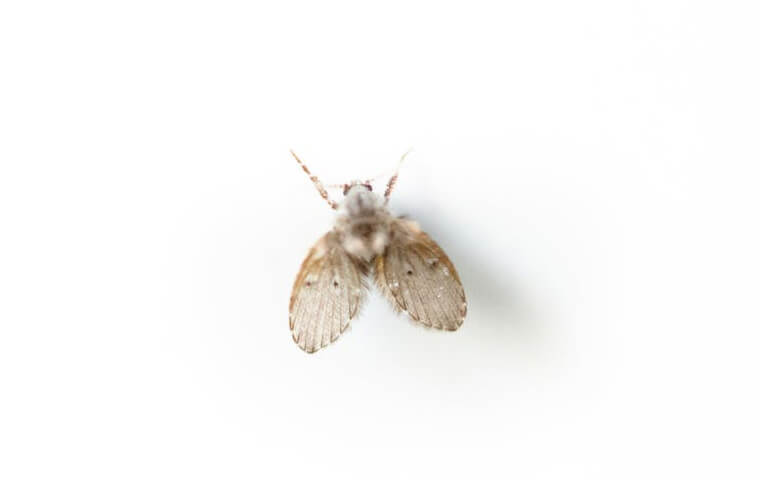Flies
What are flies?
Flies belong to the insect order Diptera, which means “two wings”. Flies have only one pair of wings, while most other adult insects have two pairs. Flies are prolific breeders, and if the conditions are right, they can become a big problem in any home or commercial property. Most flies live and fly close to the ground, rather than at great heights.

Three of the most common species of flies living in New Jersey, northern Delaware, and eastern Pennsylvania include the house fly, fruit fly, and sewer fly.
House flies
House flies are dull and gray in color. They have two velvety stripes on their faces, and their thoraxes have four narrow stripes running down. They also have specialized spongy mouthparts that they use for feeding on liquids. Their larvae (maggots) are eyeless, legless, and cream-colored, and they taper from rear to head.
Fruit flies
Fruit flies have small, oval-shaped bodies and large compound eyes that are red, brown, or black. Their bodies are yellowish-brown to brownish-black in color and their wings are translucent. The larvae’s body is white, except for their two dark-colored mouth hooks.
Sewer flies
Sewer flies are a small species of flies. They are dark or grayish in color and their bodies and wings are covered in fuzzy hairs. Sewer flies are poor fliers. The worm-like larvae are whitish in color and legless. These flies are also commonly referred to as “drain flies”.
Are flies dangerous?
Yes, flies are dangerous pests. Flies pick up bacteria and disease on their bodies as they fly around, feeding and landing on unsanitary things like carrion, excrement, decaying vegetation, and debris in drains and sewers. They can spread many diseases, human pathogens, and parasites to people, such as dysentery, diarrhea, cholera, conjunctivitis, and parasitic tapeworms. Flies living in or around your home should be eliminated as quickly as possible.
Why do I have a fly problem?
Flies are attracted to a wide variety of foods, including decaying vegetation, meat, excrement, fruits and vegetables, carrion, and fermenting liquids. They are attracted to any property that provides them with easy access to their food sources. Once on your property, they will make their way inside through spaces around windows and doors, torn screens, and cracks in exterior walls while foraging for food. Fruit flies often make their way into homes on infested fruits and vegetables purchased from the grocery store.
Where will I find flies?
Outside, flies are found in large numbers around food and water sources including compost piles, gardens, clogged gutters, garbage bins, and animal excrement. Fruit flies feed and breed on ripe or decaying fruits and vegetables, and have the potential to be a big problem inside of homes, grocery stores, restaurants, and food processing facilities. Flies that make their way inside of homes tend to gather in the kitchen, pantry, and other areas where food is found. Drain flies feed and breed inside of debris in drains, and are often seen hovering around sinks and bathtubs.
How do I get rid of flies?
To eliminate current problems with flies, as well as prevent future ones, it is best to partner with an experienced professional. At Bugaboo Pest Control, our professionals provide customers with the residential or commercial pest control services needed to solve your unique fly problem. To learn more about our extermination services that are offered throughout New Jersey, eastern Pennsylvania, and northern Delaware, contact Bugaboo Pest Control today!
How can I prevent flies in the future?
Flies in New Jersey, eastern Pennsylvania, and northern Deleware are a nuisance and create many problems for homes and businesses.
Dealing with flies in or around your home? The following tips can deter these pests from your property:
- Make sure outdoor trash cans and compost bins have locking or tight-fitting lids on them.
- Plant vegetable and fruit gardens a distance away from the outside of your home.
- Eliminate points into your home.
- Remove easy access to water by making sure gutters are maintained.
- Store food in your home either in the refrigerator or in containers with air-tight lids.
- Limit breeding sites by keeping drains clear of clogs, keeping lids on trash cans and compost bins, and clean up after pets daily.

